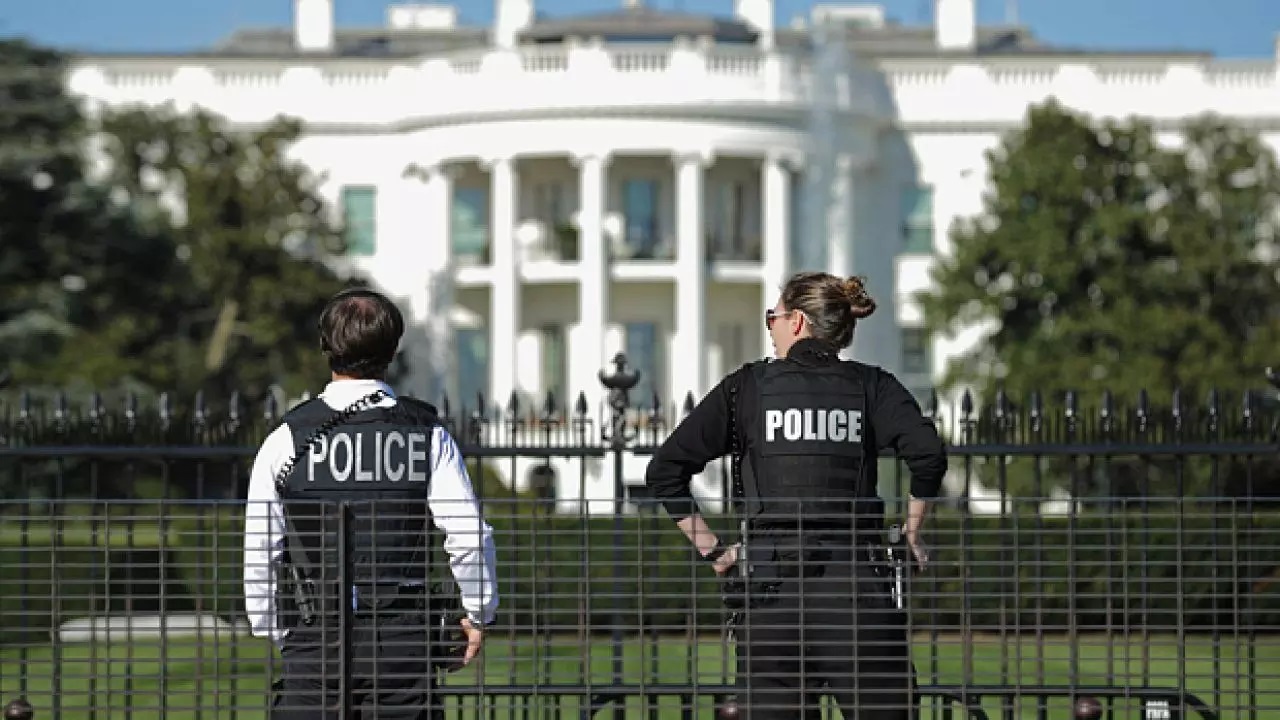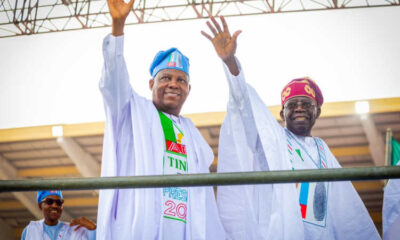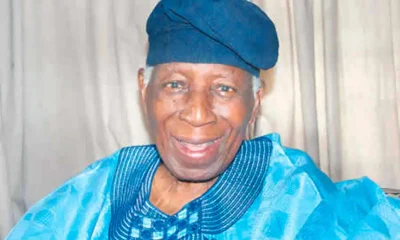Foreign
Why India’s Modi failed to win outright majority

Indian PM Narendra Modi has won a third consecutive term in a much tighter general election than anticipated.
His Bharatiya Janata Party (BJP) looks set to fall short of a majority and is leading in the 543-seat parliament, below the required 272 seats. However its coalition partners have gained additional seats.
The results are a personal blow to Mr Modi, who has always secured majorities in elections as both chief minister of Gujarat state and India’s prime minister, and dominated the country’s politics for a decade.
The verdict marks a surprising revival for the Congress Party-led INDIA opposition alliance, defying earlier predictions of its decline, and sharply diverging from both exit polls and pre-election surveys.
More than 640 million people voted in a marathon seven-week election, hailed as a “world record” by election authorities. Nearly half of the voters were women.
Many world leaders have crawled across the finishing line in their third term elections and Mr Modi is no exception. The BJP remains India’s single largest party by seats, and if Mr Modi secures a third term with his allies, the prime minister matches the record of Jawaharlal Nehru, India’s first premier.
But the significant loss of seats for his party – more than 50 – dims the allure of a third term, especially given Mr Modi’s campaign targeting 400 coalition seats, making anything less seem like an under-achievement.
This has led to jubilation in the Congress camp and some despair in BJP quarters. Despite the BJP emerging as the single largest party, the burden of hype and expectations has left many of their supporters disheartened.
Mr Modi’s supporters believe securing a third term can be attributed to several factors: a record of stable governance, the appeal of continuity, efficient welfare programmes, and the perception that he has enhanced India’s global image.
To his Hindu nationalist base, Mr Modi delivered on key manifesto promises: revoking the autonomy of Indian-administered Kashmir, building the Ram temple in Ayodhya and implementing a controversial citizenship law. Many BJP-ruled states have implemented laws tightening regulations on interfaith marriages.
The BJP’s significant drop in seats may be linked to joblessness, rising prices, growing inequality and a controversial army recruitment reform, among other things. Mr Modi’s harsh and divisive campaign, particularly targeting Muslims, could also have alienated voters in some regions.
His ambitious slogan “Ab ki baar, 400 paar,” aiming for more than 400 seats for his NDA alliance, may have backfired, with such a massive majority raising fears of constitutional changes among the poor.
Mr Modi’s party faced its largest setback in Uttar Pradesh (UP), a state larger than the United Kingdom and three times as populous. With 80 parliamentary seats, UP holds significant sway in national politics – many consider it the gateway to Delhi. Both Mr Modi and Rahul Gandhi hold seats there.
So what are the main takeaways of this election?
A dent of Brand Modi
Mr Modi’s popularity has been also attributed to his mastery of branding, transforming routine events into spectacles and astute messaging. A weak opposition and a largely friendly media also helped him build his brand.
The election results show that Brand Modi has lost some of its shine, indicating that even Mr Modi is susceptible to anti-incumbency. In other words, he is not as invincible as many of his supporters believed. This offers renewed hope to the opposition.
A return to coalition politics
India has a history of chaotic coalition governments, although some in the early 1990s and 2000s played a significant role in implementing economic reforms.
If the BJP forms the government, it will be dependent on allies and will need to adopt a more consultative and deliberative approach.
This dependency makes it vulnerable to collapse if allies feel neglected. The party, once perceived as all-powerful, is now reliant on allies, unlike in 2014 and 2019.
A jolt to the dominant BJP
Mr Modi’s uninterrupted decade-long reign at the top has underscored India’s embrace of what some political scientists term the one-party dominant system.
This has five key traits: a charismatic leader, unrivaled control over resources and communication, unmatched organisational machinery, and an opposition in disarray. Shrinking freedoms also characterise a one-party dominant system.
Mr Modi’s BJP is not the first party to dominate Indian politics. For many years after Independence the Congress ruled without a break. Tuesday’s result has restored India to what many consider “normal politics”, with a range of parties sharing and competing for power.
A resurgent opposition
The results will energise the much-criticised Congress-led opposition.
In February, the diverse coalition known as INDIA, short for Indian National Developmental Inclusive Alliance, faced turmoil when one of its key leaders, Nitish Kumar, exited – only to later rejoin the BJP.
But led by Rahul Gandhi, the opposition ran a spirited campaign and narrowed the gap, in the face of a partisan media and despite fewer resources.
There is more hope for them ahead. The BJP holds about a third of India’s 4,000- plus state assembly seats and has lost to regional parties before. Over the next 14 months, five states are set for elections – all could be keenly contested.
With contests in Maharashtra, Jharkhand, and Haryana this year, the BJP could face substantial competition. Delhi’s upcoming election may pose challenges, while Bihar in October presents a regional hurdle.
So what could a potential third term for Mr Modi mean?
India needs much more work and some healing.
The economy, fueled by government spending, is on the upswing. Yet inequality is rising. Private investment and consumption must increase, and the poor and the middle class will need more money in their pockets to spend more.
That will not happen if there are not enough jobs. In a country bristling with ambition and frustration, younger voters are likely to drift from the BJP – around two-fifths of India’s billion-plus people are under 25.
Mr Modi has drawn criticism for marginalising Muslims, India’s largest minority, who have borne the brunt of violence. His government faces accusations of stifling dissent, with leading opposition figures jailed on what they say are trumped-up charges.
But third terms have often proved to be rocky for many leaders, with unforeseen and unpredictable events blowing governments and their plans off course.
Foreign
British actor Russell Brand charged with rape, sexual assault

British actor Russell Brand has been charged with rape, indecent assault and sexual assault between 1999 and 2005.
The charges relate to four separate women.
Brand has been interviewed multiple times by police since an investigation by the Sunday Times, the Times and Channel 4’s Dispatches in September 2023 revealed multiple serious allegations against him.
In a new video posted on X this afternoon, Brand said: “What I never was, was a rapist. I’ve never engaged in non-consensual activity.”
He added: “I’m now going to have the opportunity to defend these charges in court and I’m incredibly grateful for that.”
In a short statement, the Metropolitan Police said it had written to Brand to inform him that he was being charged with one allegation of rape, one allegation of indecent assault, one of oral rape and two further counts of sexual assault.
The force said it is alleged that:
In 1999 a woman was raped in the Bournemouth area.
In 2001 a woman was indecently assaulted in the Westminster area of London.
In 2004 a woman was orally raped and sexually assaulted in the Westminster area of London.
Between 2004 and 2005, a woman was sexually assaulted in the Westminster area of London.
Brand has been told to appear at Westminster Magistrates’ Court on 2 May, but he is believed to be in the United States.
In these situations, where a suspect may be overseas, prosecutors seek to agree the defendant’s return. If there is no co-operation from a suspect, authorities then consider seeking extradition.
In February a civil case for “personal injury” and “sexual abuse” was lodged against Brand at the High Court in London by an anonymous woman, referred to in court documents as AGX.
Police investigation
Jaswant Narwal of the Crown Prosecution Service said: “We have today authorised the Metropolitan Police to charge Russell Brand with a number of sexual offences.
“We carefully reviewed the evidence after a police investigation into allegations made following the broadcast of a Channel 4 documentary in September 2023.
“We have concluded that Russell Brand should be charged with offences including rape, sexual assault and indecent assault. These relate to reported non-recent offences between 1999 and 2005, involving four women.
“The Crown Prosecution Service reminds everyone that criminal proceedings are active, and the defendant has the right to a fair trial. It is extremely important that there be no reporting, commentary or sharing of information online which could in any way prejudice these proceedings.”
The Metropolitan Police’s detective superintendent Andy Furphy, who is leading the investigation, said: “The women who have made reports continue to receive support from specially trained officers.
“The Met’s investigation remains open and detectives ask anyone who has been affected by this case, or anyone who has any information, to come forward and speak with police. A dedicated team of investigators is available via email at CIT@met.police.uk.
“Support is also available by contacting the independent charity, Rape Crisis at 24/7 Rape and Sexual Abuse Support Line.”
Brand, who was born in Essex, rose to fame as a stand-up comedian, performing at the Hackney Empire in 2000 and later the Edinburgh Fringe.
He later moved into broadcasting, hosting national television and radio programmes.
The turning point in his career came in the mid-2000s, when he hosted Big Brother’s Big Mouth, a companion show to the hugely popular reality series Big Brother.
It provided the springboard he was looking for and led to him becoming one of the most sought-after presenters in the UK.
Brand went on to host the NME, MTV and Brit awards ceremonies, had his own debate series by E4, and fronted the UK leg of charity concert Live Earth.
But he was never far away from controversy, particularly at awards ceremonies – which provided the kind of live, anything-can-happen chaos where he was most at home.
His career included hosting radio shows on the BBC, in particular for 6 Music and Radio 2, between 2006 and 2008.
But inappropriate phone calls he made to the Fawlty Towers actor Andrew Sachs during a show in 2008 prompted a huge scandal – and ultimately led to his dismissal.
He rebounded with a Hollywood career, starring in films like Forgetting Sarah Marshall and Get Him To The Greek.
Recent years have seen him take a new direction – particularly since the start of the Covid pandemic in 2020.
Brand grew his following on YouTube as he discussed scepticism surrounding the disease.
He has developed a cult following for his views on politics and society, through videos which challenge the mainstream reporting of a range of subjects and often amplify conspiracy theories. He has also established himself as a wellness guru.
Foreign
U.S. prohibits personnel in China from romantic, sexual relationships with Chinese citizens

The U.S. government has banned American government personnel in China, as well as family members and contractors with security clearances, from any romantic or sexual relationships with Chinese citizens, The Associated Press has learned.
Four people with direct knowledge of the matter told the AP about the policy, which was put into effect by departing U.S. Ambassador Nicholas Burns in January shortly before he left China. The people would speak only on condition of anonymity to discuss details of a confidential new directive.
Though some U.S. agencies already had strict rules on such relationships, a blanket “non-fraternization” policy, as it is known, has been unheard of publicly since the Cold War. It’s not uncommon for American diplomats in other countries to date locals and even marry them.
A more limited version of the policy was enacted last summer prohibiting U.S. personnel from “romantic and sexual relations” with Chinese citizens working as guards and other support staff at the U.S. Embassy and five consulates in China. But Burns, the departing ambassador, broadened it to a blanket ban on such relations with any Chinese citizen in China in January, days before President Donald Trump took office. The AP was unable to determine exactly how the policy defined the phrase “romantic or sexual relationship.”
Two of the people with knowledge of the ban told the AP the new policy was first discussed last summer after members of Congress contacted Burns to express concern that restrictions on such relationships were not stringent enough. The House Select Committee on the Chinese Communist Party did not respond to a request for comment.
The new policy covers U.S. missions in mainland China, including the embassy in Beijing and consulates in Guangzhou, Shanghai, Shenyang and Wuhan, as well as the American consulate in the semi-autonomous territory of Hong Kong. It does not apply to U.S. personnel stationed outside China.
The only exception to the policy is U.S. personnel with pre-existing relations with Chinese citizens; they can apply for exemptions. If the exemption is denied, they must end the relationship or leave their position, the people said. Anyone who violates the policy will be ordered to leave China immediately.
The policy was communicated verbally and electronically to American personnel in China in January, but has not been publicly announced.
The State Department said it does not comment on internal matters. The National Security Council referred questions to the State Department. Burns, the former ambassador, did not reply to an AP request sent to his email address at The Cohen Group, a consultancy that he rejoined as vice chair in February.
Intelligence services across the world have long used attractive men and women to obtain sensitive information, famously during the Cold War. The State Department and other agencies with offices in China have long had stringent reporting requirements on personal relationships for American personnel stationed there, as well as rivals considered high intelligence threats such as Russia or Cuba.
Declassified State Department documents show that in 1987, the U.S. government barred personnel stationed in the Soviet bloc and China from befriending, dating or having sex with locals after a U.S. Marine in Moscow was seduced by a Soviet spy. Such restrictions were relaxed after the collapse of the Soviet Union in 1991, according to news reports at the time.
In China, a blanket ban on such relations has not been in effect for many years. Until the new ban in January, U.S. personnel in China were required to report any intimate contact with Chinese citizens to their supervisors, but were not explicitly forbidden from sexual or romantic relationships.
U.S. diplomats and intelligence experts say that Beijing continues to aggressively use so-called honeypots to access American secrets. In presentations before being stationed in China, U.S. personnel are briefed on case studies where Chinese intelligence services sent attractive women to seduce American diplomats, and warned that dozens of Chinese state security agents can be assigned to monitor any individual diplomat of interest.
Little is known about the U.S. government’s non-fraternization policies elsewhere, as they are considered classified. It is unknown how restrictive such policies are in other countries.
In recent years, tensions between Washington and Beijing have escalated over trade, technology and geopolitical competition.
Peter Mattis, a former CIA analyst and president of The Jamestown Foundation, a Washington-based think tank, said there were at least two publicized cases in which Chinese agents seduced American diplomats stationed in China, though he hasn’t heard of such a case in recent years.
Mattis added that another issue is that Chinese state security doesn’t gather intelligence just through spies, but also by pressing ordinary Chinese people for information, often through threats or intimidation. That, Mattis said, means any Chinese citizen who dates an American diplomat could be vulnerable to coercion.
“The MSS is willing to leverage any human connection that a target has to collect intelligence,” Mattis said, using an acronym referring to China’s Ministry of State Security. “This rule change suggests the MSS has gotten a lot more aggressive at trying to access the embassy and U.S. government.”
The Chinese foreign ministry did not comment on the ban, saying in a faxed statement that it was “more appropriate to ask the U.S. about this question.”
China also has been tightening already strict controls on its personnel overseas, according to Chinese regulations, news reports and four people familiar with China’s bureaucracy who spoke on condition of anonymity so they could discuss a sensitive topic. In recent years, Beijing began strictly enforcing regulations that bar promotions for Chinese civil servants with spouses who acquired foreign citizenship and restrict diplomats from spending an extended period of time in one country, forcing some to return to China.
China’s foreign ministry and many other government bodies bar their officials and staff from sexual or romantic relations with foreign citizens, while members of the Chinese military or police are generally barred from leaving China altogether without express approval from their supervisors.
Foreign
Suspicious package found near White House day after Trump imposed tariffs

Law enforcement is currently responding to reports of a suspicious package near the White House.
The area has been secured, and specialized units are on-site to assess the situation.
Authorities are urging the public to avoid the vicinity until further notice.
The section between 15th and 17th streets is completely shut down.
The bomb squad is now examining a suspicious package discovered in a dumpster nearby.
The package was found about 500 meters from the White House. President Donald Trump is currently in residence.
This is coming a day after Trump imposed tariffs on several countries, including US allies.
-

 Politics12 hours ago
Politics12 hours agoTinubu Gives Fani Kayode, Others New Appointments (See Full List)
-

 News12 hours ago
News12 hours agoDANGER! Ex-Soldier Abubakar Affan Vows to Kill VeryDarkMan ‘Like Deborah Samuel’
-

 News15 hours ago
News15 hours agoWhy NYSC maybe extended by FG- Minister
-

 News15 hours ago
News15 hours agoIbas moves to rehabilitate damaged Rivers LG secretariats
-

 News12 hours ago
News12 hours agoJust in: Ex-Oyo governor, Olunloyo is dead
-

 News15 hours ago
News15 hours agoWike commissions another solar-powered market in Abuja
-

 Economy14 hours ago
Economy14 hours agoCrude prices slump to $65 first time since 2021
-

 News7 hours ago
News7 hours agoHerdsmen Storm Benue Hometown Of Ex-Senate President David Mark






